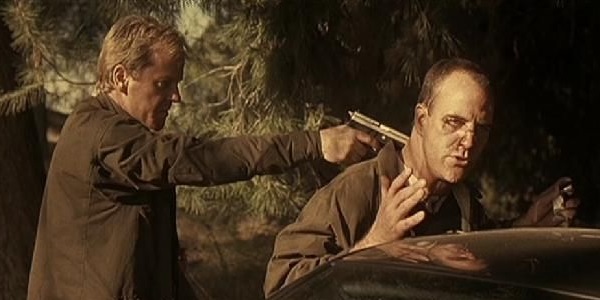5. Think Small

One of the problems that bedevilled the makers of 24 right from the start was that of escalation. Season 1 was a fantastically taut espionage thriller where everything seemed new and shiny. The technology was exciting, the tension unbearable and the premise reasonably simple-Jack had 24 hours to save both his family and a presidential candidate from assassination. As the season finale ended, there was a definite sense of 'How the hell do they top that?'. The solution involved turning everything up to 11. Season 2 saw the tension ramped up with a nuclear bomb being brought into play; At the time, this was a fantastic idea and saw the adrenaline and tension rocketed up but it left the writers with the obvious problem of how to top the threat of a nuke. They managed this brilliantly in the following season-easily the best one, in my humble opinion- with a weaponised virus but every season since then has merely seen variations on the same themes or complete retreads. The makers fell into the classic trap of assuming everything had to be bigger and louder than what went before. The result was tiring, to say the least. Season four didn't know where to turn and threw out a highly confusing plot line that ended with the nuclear threat again. Season 6 repeated the same pattern, with even less success. Yet it doesn't always have to be this way. 24 has always been at its best when dealing with an immediate danger, such as the Bauer family being kidnapped or Jack trying to bring President Palmers killers to justice. We know already that the new miniseries is set in London. Why not have Bauer using a false identity to help bring in a serial killer, or a drugs ring? Bigger isn't always better.
 One of the problems that bedevilled the makers of 24 right from the start was that of escalation. Season 1 was a fantastically taut espionage thriller where everything seemed new and shiny. The technology was exciting, the tension unbearable and the premise reasonably simple-Jack had 24 hours to save both his family and a presidential candidate from assassination. As the season finale ended, there was a definite sense of 'How the hell do they top that?'. The solution involved turning everything up to 11. Season 2 saw the tension ramped up with a nuclear bomb being brought into play; At the time, this was a fantastic idea and saw the adrenaline and tension rocketed up but it left the writers with the obvious problem of how to top the threat of a nuke. They managed this brilliantly in the following season-easily the best one, in my humble opinion- with a weaponised virus but every season since then has merely seen variations on the same themes or complete retreads. The makers fell into the classic trap of assuming everything had to be bigger and louder than what went before. The result was tiring, to say the least. Season four didn't know where to turn and threw out a highly confusing plot line that ended with the nuclear threat again. Season 6 repeated the same pattern, with even less success. Yet it doesn't always have to be this way. 24 has always been at its best when dealing with an immediate danger, such as the Bauer family being kidnapped or Jack trying to bring President Palmers killers to justice. We know already that the new miniseries is set in London. Why not have Bauer using a false identity to help bring in a serial killer, or a drugs ring? Bigger isn't always better.
One of the problems that bedevilled the makers of 24 right from the start was that of escalation. Season 1 was a fantastically taut espionage thriller where everything seemed new and shiny. The technology was exciting, the tension unbearable and the premise reasonably simple-Jack had 24 hours to save both his family and a presidential candidate from assassination. As the season finale ended, there was a definite sense of 'How the hell do they top that?'. The solution involved turning everything up to 11. Season 2 saw the tension ramped up with a nuclear bomb being brought into play; At the time, this was a fantastic idea and saw the adrenaline and tension rocketed up but it left the writers with the obvious problem of how to top the threat of a nuke. They managed this brilliantly in the following season-easily the best one, in my humble opinion- with a weaponised virus but every season since then has merely seen variations on the same themes or complete retreads. The makers fell into the classic trap of assuming everything had to be bigger and louder than what went before. The result was tiring, to say the least. Season four didn't know where to turn and threw out a highly confusing plot line that ended with the nuclear threat again. Season 6 repeated the same pattern, with even less success. Yet it doesn't always have to be this way. 24 has always been at its best when dealing with an immediate danger, such as the Bauer family being kidnapped or Jack trying to bring President Palmers killers to justice. We know already that the new miniseries is set in London. Why not have Bauer using a false identity to help bring in a serial killer, or a drugs ring? Bigger isn't always better.